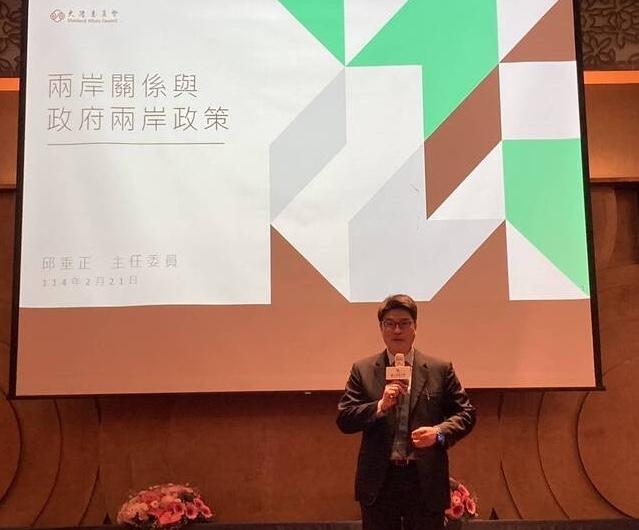The Ministry of Education is seeking to discuss inviting Chinese students to study in Taiwan, but there has been no response from Beijing, Mainland Affairs Council (MAC) Minister Chiu Chui-cheng (邱垂正) said today.
Speaking at the National Conference for the University Presidents of Taiwan, Chiu called on China not to use educational exchanges as a tool to push “united front” tactics.
The minister was invited to give a speech on cross-strait relations and policies.

Photo: Yang Mien-chieh, Taipei Times
Since 2004, about 20,000 agreements have been signed between cross-strait educational institutions, and educational exchanges have gradually stabilized following the COVID-19 pandemic, he said.
Last year saw about 2,000 Chinese students coming to Taiwan for short-term study and more than 300 Chinese school presidents or vice presidents visiting Taiwan for exchange, Chiu said.
However, China still seeks to control the number of Chinese students coming to Taiwan, he said.
In 2020, China used the pandemic and political situation to temporarily ban Chinese students from enrolling in Taiwanese institutions, leaving only about 1,500 students in Taiwan last year, he added.
On the other hand, China has been recruiting Taiwanese students to study in China, creating an imbalance in cross-strait academic exchanges, he said.
The Taiwanese government has already implemented 10 policies to encourage Chinese students to study in Taiwan, including recognizing more Chinese qualifications, increasing quotas for admission of Chinese students, and as of February last year, expanding the National Health Insurance system to cover Chinese students, he said.
The ministry is considering plans to increase enrollment of Chinese students from third countries, which the council would cooperate with, he said, adding that more information would be released to the public should the plan reach a later stage.
Minister of Education Cheng Ying-yao (鄭英耀) this week said that Taiwanese institutions would be banned from collaborating with four Chinese institutions due to security concerns: Huaqiao University in Xiamen and Quanzhou, Jinan University in Guangzhou and Beijing Chinese Language and Culture College.
The council would respect the ministry’s decision and cooperate accordingly, Chiu said, adding that Taiwanese students may still attend 154 Chinese universities.
Educational exchanges should be based on reciprocity, respect and fairness, he said, adding that restrictions on Chinese students coming to Taiwan often arise due to strict regulations from Beijing, not from Taipei.
Additional reporting by Yang Mien-chieh

Taiwan is stepping up plans to create self-sufficient supply chains for combat drones and increase foreign orders from the US to counter China’s numerical superiority, a defense official said on Saturday. Commenting on condition of anonymity, the official said the nation’s armed forces are in agreement with US Admiral Samuel Paparo’s assessment that Taiwan’s military must be prepared to turn the nation’s waters into a “hellscape” for the Chinese People’s Liberation Army (PLA). Paparo, the commander of the US Indo-Pacific Command, reiterated the concept during a Congressional hearing in Washington on Wednesday. He first coined the term in a security conference last

Prosecutors today declined to say who was questioned regarding alleged forgery on petitions to recall Democratic Progressive Party (DPP) legislators, after Chinese-language media earlier reported that members of the Chinese Nationalist Party (KMT) Youth League were brought in for questioning. The Ministry of Justice Investigation Bureau confirmed that two people had been questioned, but did not disclose any further information about the ongoing investigation. KMT Youth League members Lee Hsiao-liang (李孝亮) and Liu Szu-yin (劉思吟) — who are leading the effort to recall DPP caucus chief executive Rosalia Wu (吳思瑤) and Legislator Wu Pei-yi (吳沛憶) — both posted on Facebook saying: “I

The Ministry of Economic Affairs has fined Taobao NT$1.2 million (US$36,912) for advertisements that exceed its approved business scope, requiring the Chinese e-commerce platform to make corrections in the first half of this year or its license may be revoked. Lawmakers have called for stricter enforcement of Chinese e-commerce platforms and measures to prevent China from laundering its goods through Taiwan in response to US President Donald Trump’s heavy tariffs on China. The Legislative Yuan’s Finance Committee met today to discuss policies to prevent China from dumping goods in Taiwan, inviting government agencies to report. Democratic Progressive Party Legislator Kuo Kuo-wen (郭國文) said

The Ministry of Economic Affairs has fined Taobao NT$1.2 million (US$36,900) for advertisements that exceeded its approved business scope and ordered the Chinese e-commerce platform to make corrections in the first half of this year or its license would be revoked. Lawmakers have called for stricter supervision of Chinese e-commerce platforms and more stringent measures to prevent China from laundering its goods through Taiwan as US President Donald Trump’s administration cracks down on origin laundering. The legislature’s Finance Committee yesterday met to discuss policies to prevent China from dumping goods in Taiwan, inviting government agencies to report on the matter. Democratic Progressive Party